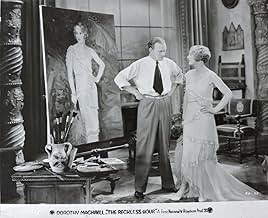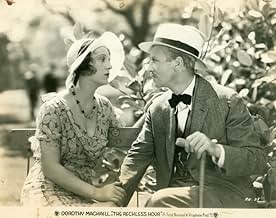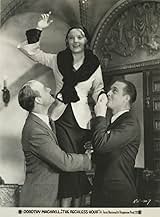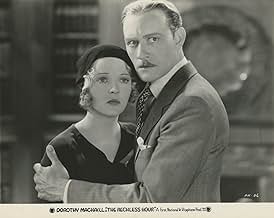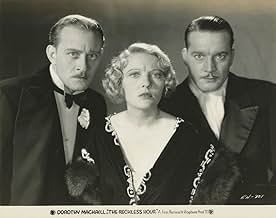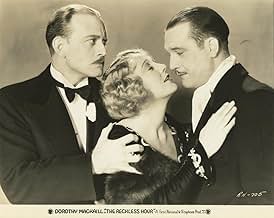Adicionar um enredo no seu idiomaIn New York City, a young model is swept off her feet by a debonair, handsome young man. Unfortunately for her, he didn't want to get married but had been stringing her along. When she reali... Ler tudoIn New York City, a young model is swept off her feet by a debonair, handsome young man. Unfortunately for her, he didn't want to get married but had been stringing her along. When she realizes he doesn't want her, she will not force him even though she learned she was pregnant. ... Ler tudoIn New York City, a young model is swept off her feet by a debonair, handsome young man. Unfortunately for her, he didn't want to get married but had been stringing her along. When she realizes he doesn't want her, she will not force him even though she learned she was pregnant. She becomes bitter and angry at all men, until she meets a gentle and kind artist who trie... Ler tudo
- Direção
- Roteiristas
- Artistas
- Seymour Jennison
- (as William House)
- Hal - Allen's Friend
- (não creditado)
- Crane's Butler
- (não creditado)
- Rita
- (não creditado)
- Stevens - Adams' Butler
- (não creditado)
- Direção
- Roteiristas
- Elenco e equipe completos
- Produção, bilheteria e muito mais no IMDbPro
Avaliações em destaque
Meanwhile her younger sister(Joan Blondell) is dating the guy Maggie jilted. Her father (H.B. Warner) is having a tough time with his book shop, and her mother (Helen Ware) defends Maggie's dating the rich guy. Things start to go wrong, however, when Maggie discovers she is pregnant. She assumes the rich guy will marry her. After he dumps her, she's left to explain things to her father.
After some time in a "rest home," she meets another rich guy (Conrad Nagel). Has she learned her lesson? Will he be interested in "damaged goods"? Should she tell him everything?
Mackaill is terrific as Maggie and earns audience sympathy by being so nice. She's matched here by the snappy Joan Blondell who drops wise cracks every time she opens her mouth. Warner and Ware are fine as the parents. Byron is an appropriate louse. Nagel is fine as the nice guy. Also in the cast are Billy House as Jennison, Dorothy Peterson as his wife, and Joe Donahue as the sourpuss Hal.
As a pre-Code film, there are some surprises in the way the women act. A few years later, the Code would force certain behaviors and conclusions. There's one outrageous exchange when Maggie declines to go out with her drippy boyfriend. When Blondell's character jumps on her for standing him up, the mother says something like, "Leave Maggie alone. She's been on feet all day." Blondell (whose character works at Macy's) snaps back, "And where have I been all day? On my back?"
Weren't things different once upon a time! This is firmly rooted in the morality of the early thirties and the moral being preached in this was the same as was preached in so many others of the early thirties: know thy place. Watched today the message feels chauvinistic and regressive but although these people look like us, they are from a very different society, a society where such moralising worked.
Marriage was massively important. It was such a different thing back then - it wasn't just a romantic commitment, it was vital for survival. What else could most young women do - there were no other options. Young women needed to get married primarily to have somewhere to live - especially during The Depression. In early thirties movies it seems crazy to us how people seem to marry each other at the drop of a hat but marriage was for security. At the most basic level, marriage was a contract to look after a man, give him children and he will give you somewhere to live. These themes were explored much better in other films.
CALL HER SAVAGE may have been the only decent film John Dillon directed. This is not his finest hour, he doesn't manage to make you care about his cast, he doesn't make them real. Walter Byron is basically Captain Hook from the Christmas Pantomime, Dorothy MacKaill is insipid and H B Warner, the 'concerned dad' is acting like they're making a silent movie. Only Joan Blondell in her little role as feisty little sister acts like she's in a normal film.
Its stilted and unnatural feel possibly wasn't all Mr Dillon's fault, production was being disrupted at the time as Warner's recording equipment was being replaced as this was being made. Ironically the 'inventors' of the talkies were now having to play catch up with the other studios but nevertheless, others at Warners managed to make decent pictures then. This just feels amateurish and unpolished.
I've said that Dorothy MacKaill's character Marie is rather insipid but for the story to work, she has to be nothing more than a mouse. Girls in 1931 would however be able to relate to someone like this more so than to someone more interesting like Joan Crawford, it doesn't make for entertainment though. Whilst the attitudes prevalent of the time makes uncomfortable viewing today, this was how things were and how people thought. Marie nearly ruins her life by trying to be different, trying to marry the man of her choice, not the choice of her parents. It should not annoy us that having one's own mind was frowned upon, that's what kept society working then.
What's been mentioned is how a supporting role from Joan Blondell outshines all the established stars. Joan shortly-to-become-the-sexiest-woman-in-the-world Blondell isn't actually that good but her co-stars are just so dull. She wasn't bad - in fact her performance in this as the sassy sister (or only character actually with any character) helped to secure her long time contract.....in films a lot better than this.
At home Margie has a rather difficult situation. Mom (Helen Ware) is dissatisfied with Dad's (H.B. Warner as Walter Nichols) income, with him owning a book shop and being happy with just that. She wants him to be bolder with his money and become an investor and a big shot, and she's constantly nagging on the subject. Margie is bored with her main suitor, Harry Gleason (Joe Donahue), but sister Myrtle (Joan Blondell), for some unknown reason, is just aching to take this zoot suited wise-guy away from her sister and drag him to the nearest JP. Conrad Nagel plays artist Eddie Adams with which Margie has a second course of reckless moments in the last half of the film after she becomes cynical about romance. She and the artist are a good match as he has become cynical too due to a faithless wife and his resulting failed marriage.
This is pretty much a precode with lots of conventional angles - middle class girl thinking she has found her rich prince charming only to find out he's a heel and that when it comes to his family the apple hasn't fallen far from the tree, feuding parents with one parent lending a sympathetic ear to the troubled daughter and the other parent oblivious and self-involved, and a couple of colorful neighborhood characters to lighten up the melodrama just a bit.
A couple of things of note. Joan Blondell's mating ritual with Joe Donahue's Harry Gleason just had me thinking - I'd actually believe she found this character interesting if Harry was being played by James Cagney, who was also still a supporting player at this point. After all, it was the kind of street wise character that Cagney excelled at playing that Joe was obviously aiming at portraying, but instead he just seems like a street-wise wannabe braggart. There's also a very interesting scene at a club when Margie is out with Allen. When he's talking things over with Eddie as to his plans that evening Allen basically tells Eddie - with Margie standing right there - that he's occupied because the two are spending the night together. That Allen would talk about her like she was a piece of meat in front of a total stranger should have told Margie that this relationship was not on its way to the altar. Finally notice Ivan F. Simpson as Eddie's butler who also played similar roles in George Arliss' films.
I'd recommend this as a very typical precode of the era, but with interesting performances by those involved and a look at Warner Brothers in transition, as it would soon abandon the stars it started out with in talking pictures such as Dorothy Mackaill and H.B. Warner and turn more towards stars such as Joan Blondell.
Você sabia?
- CuriosidadesThe play, "Ambush," opened on Broadway in New York City, New York, USA on 10 October 1921 and had 90 performances. The opening night cast included Florence Eldridge as Margaret and Frank Reicher as Walter.
- Erros de gravaçãoWhen Margaret takes the 1789 Robert Burns edition from her father and sets it on a shelf, she crosses under the microphone boom and it casts a shadow on her.
- Citações
Edward Adams: Alan, old boy!
Allan Crane: Ed Adams! Of all people - what are you doing in this country? I thought you were in Paris!
Edward Adams: I came back to do a series of covers for *Pose*.
Allan Crane: Good work. Is the wife with you?
Edward Adams: No, she's in China.
Allan Crane: By herself?
Edward Adams: Not exactly. Evelyn Grant's husband is with her.
Allan Crane: Honestly?
Edward Adams: I wouldn't call it honestly, but he's with her.
Allan Crane: Oh, I'm sorry, Ed; really I am. What on earth can she see in that half-portion?
Edward Adams: Full-portion bank account, I guess.
- Trilhas sonorasNevertheless (I'm in Love with You)
(1931) (uncredited)
Music and Lyrics by Bert Kalmar and Harry Ruby
Played as dance music by the band at the Casino
Principais escolhas
Detalhes
- Data de lançamento
- País de origem
- Idioma
- Também conhecido como
- Pigen fra Broadway
- Locações de filme
- Empresa de produção
- Consulte mais créditos da empresa na IMDbPro
- Tempo de duração
- 1 h 11 min(71 min)
- Cor

